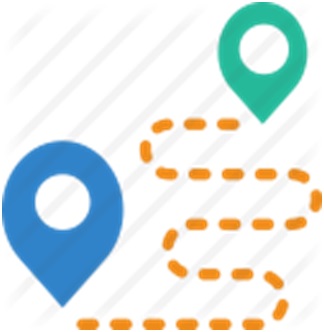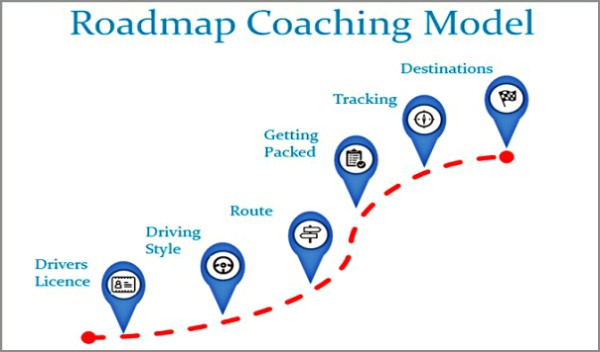A Coaching Model Created by Marian Gibbs
(Career Coach, NEW ZEALAND)

Executive Summary
We are all on a journey from here to there. And just like when we travel, along the way, we’ll see many pit-stops, diversions and beautiful delights. So where exactly are we headed? And what’s the best route? Coaching can play a key role is helping us get clear on the journey we want to take; a ‘road-map’ if you like for how to get there; and checkpoints for progress along the way.
My Coaching Model follows the analogy of a Road-trip (see the diagram below). For all good trips, there are a few steps you need to go through, starting with the basics of having your license, understanding your own (and others driving style; knowing the destination and planning your route). Knowing what to pack for the journey then becomes easy. The final step becomes the tracking – how are you moving toward your destination. The framework of this paper walks you through these key steps, and then suggests practical coaching exercises or questions that may be useful at each stage.

 First things first – got your licence?
First things first – got your licence?
In the coaching context, there are two core elements that decide on your fit to take this coaching journey (i.e.: are you coachable):
- Are you looking through the windscreen or the rear view mirror? (is your focus on your future, or your past?)
- Do you actually want to get better at driving? (your learning agility will depend primarily on your self-awareness)
The Windscreen or the Rear View?
The windscreen is larger than the rear view mirror for a good reason. Ahead is where the future lies, so if you are spending too much time checking your rear view, you are missing turn-offs (for our route); short-cuts (new opportunities) and road-blocks (obstacles to our goal). Don’t get me wrong, I wouldn’t be without a rear view mirror. But the purpose of it becomes one of perspective. How far have you come? Is there anything coming up behind you that needs attention (e.g. old habits)?
Advanced Driving Skills (How well do you drive?)
As you could imagine, the more you drive, the more you come across challenges that test you. The degree to which you notice and learn (improve your driving ability) is critical.
Without this, you won’t get far. As Daniel Goleman said, self-awareness is a keystone of Emotional Intelligence. So, are you ready to improve your driving? Let’s look at some tools that may be useful at this point.
Coaching Exercises/Tools to assist (Coachability)
Life Story: Describe the path that got you to this point (a rich way to understand the key ‘inflection points’[1] of a clients’ life)
Coaching Exercises/Tools to assist (Agility)
New Experiences: Describe a new experience that recently occurred.
Daily Journal: notice what goes on consistently for you
Useful Coaching Questions
 Your driving style
Your driving style
Next up on the model is Driving Style. How exactly do you like to drive? Wish you were on a grand-prix track? Or do you like to keep your wits about you. How you like to drive, is often a reflection of your personal preferences. Need to move quickly or cautiously? Prefer off-the-beaten-track, or the known roads? Local roads, or the highway?
Understanding your own style enables you work with your natural strengths and mitigate your own limitations. It also helps you understand your key drivers (your beliefs, needs and stressors). With that understood, it’s a smaller jump to understanding and appreciating that not everyone has (or should have) the same approach as you. Knowing this will help you cope with those other drivers on the road who just don’t drive like you. So instead of racing up behind and honking the horn at the ‘grandma’ driver up ahead, you can respect their driving style (and their need to get there safely). Instead, you can adjust our own driving style which has the added advantage of reducing road-rage (interpersonal friction). So what tools/questions might be useful at this point. Let’s see.
Coaching Tools to assist
Profiling tools can help to provide a framework from which you can reflect back the individual’s ‘natural driving style’ (and others’) such as:
Coaching Questions
Perspective building exercises such as
 Where are you headed/Where’s the finish line?
Where are you headed/Where’s the finish line?
OK, so you can drive, where exactly do you want to get to? Where’s the finish line? As Alice famously found out (in Lewis Carroll’s Alice in Wonderland), ‘if you don’t know where you’re headed, anywhere will get you there’.
So you need to be clear on where you want to get to, our destination, otherwise it’s just a Sunday drive (don’t get me wrong, a Sunday drive can be great sometimes). What do you want to achieve? What’s your goal today? In 6 months? In 5 years? To be truly effective, you’ve actually got to think of this road-map from a longer lens. The destination therefore isn’t your immediate goal or goals. The destination is your legacy. And once you have a clear vision of that, you can assess potential goals against this – do they get you closer to your legacy vision? The goals therefore become just one of the stops along the way (more on goals in the ‘Route’ section later).
Coaching Tools to assist (Legacy)
Values/Life Purpose exercises can help to align the vision with something
Role Models exercise: Describe who are your role models, why, what do they demonstrate/represent (these typically align with your own values)
Eulogy: Write your own Eulogy (what you hope people will say about you when you go)
Visioning exercises:
Wheel of Life exercise:
Create a Vision Board
Values Exercise: Choose the values (from a list) that fit you best
Coaching Questions
 Which route do you take?
Which route do you take?
Once you know where you are headed, the next step becomes working out the best path to get there. GPS, maps, your own and others knowledge all act as tools to help us work out the best path for us.
Sometimes you have the general idea (get a job; succeed in a new one; exit a bad one), or in life (get healthier; richer; bring in more joy). Sometimes you know the specifics “I want to lose 10 kilograms” and sometimes it just isn’t clear, as in “I feel stuck”.
This is where you work to identify what exactly is the real goal (or goals). And it might not be the first one you thought you wanted. The real ones often have a way of hiding in the back recesses of our consciousness. But funnily enough, if you listen closely for a reaction, our body can often tell us when we’ve hit the mark (mindfulness exercises can come in handy here).
And once you know the goal, is it the road less travelled, or an established short-cut that will serve you best? Or something else entirely?
From a coaching perspective, what tools do you have to help you identify & discriminate between the options? In addition, as part of considering the options available to us, you also need to anticipate any major obstacles. This way, a more realistic path can be chosen (or at least you can prepare our emergency supplies for the journey!).
Coaching Tools to assist
Pros & Cons (Assist the client to draw up their own Pro’s and Cons of a decision). Notice when they:
Mindfulness exercises to help the client notice the subtle shifts/events